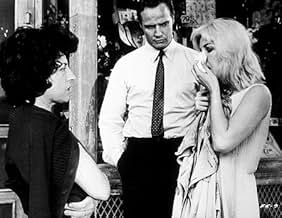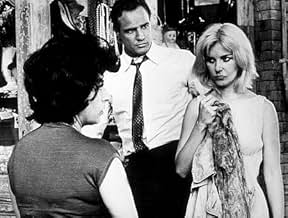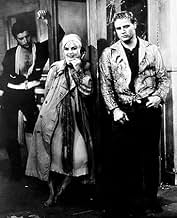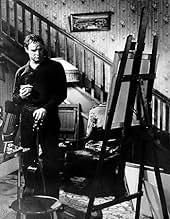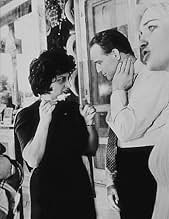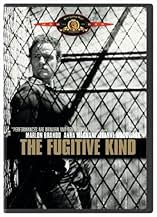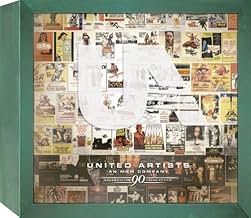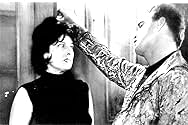IMDb रेटिंग
7.1/10
7.9 हज़ार
आपकी रेटिंग
अपनी भाषा में प्लॉट जोड़ेंA guitar-playing drifter wanders into a small Mississippi town and inflames two troubled women.A guitar-playing drifter wanders into a small Mississippi town and inflames two troubled women.A guitar-playing drifter wanders into a small Mississippi town and inflames two troubled women.
- पुरस्कार
- कुल 2 जीत
Madame Spivy
- Ruby Lightfoot
- (as Spivy)
Jeanne Barr
- Bit Part
- (बिना क्रेडिट के)
फ़ीचर्ड समीक्षाएं
The Fugitive Kind is a hot story of desire and loss and craving and heartbreak between a man and two women set in the deep south. Sounds like quintessential Tenessee Williams, and it is in spurts. Sometimes Williams leans towards being a little preachy, however true (little moments like when Brando and Stapleton have a quiet back and forth about racism via her painting kind of nails it on the head much), but it's his skills at doing melodrama that strike up the coolest beats. In fact, this is one of those super-cool movies of the late 50s that could have only starred someone like Brando, who looks at times disinterested in the scene but at the same time completely engaged, curious, smooth, harsh, and knowing of what life can bring with his trusty Ledbelly-signed guitar. It's not necessarily a towering work for the ages ala Williams collaboration 1 Streetcar Named Desire. But that doesn't mean it should be much under-looked either.
As an early effort for Lumet it's also a scorcher dramatically; he's so good with the actors that whatever little missteps the script might take in pouring on the poetic prose in how some of the characters talk (there's a scene between Brando and Anna Magnani's characters by some ruin of a spot where she says people used to make love that is actually quite boring) can be usually forgiven. Magnani especially is interesting because she should be a case of miscasting, which, apparently in later years, Lumet admitted to. She seems low-key at first, but her strengths bloom out tenfold when it comes time to act like the hard-knock-life kind of woman she is, who's in a crap marriage and had a horrible affair with a man who didn't do anything after the summer they spent together. Now she's put into a situation where she does and doesn't want this drifter, and vice versa, and she's sometimes just as cool (though also quite tough and demanding in that big Italian mama way) as her counterpart.
Meanwhile there's also Joanne Woodard, who has the kind of part many actresses love to chew on; feisty, outspoken, loud but also emotionally moody to the point that she admirably tries (and doesn't quite get to) the heights of Vivien Leigh with her classic Blanche Dubois. Overall, Lumet gets a good feel for the period- and shot in New York state no less- while working with good material and an even better cast. It won't ever be as revered as his other work, and at the same time it's much better than some would give it credit for, where the tragedy acts like another sweaty Southern caricature bemoaning existence and fitting on a bad pair of shoes.
As an early effort for Lumet it's also a scorcher dramatically; he's so good with the actors that whatever little missteps the script might take in pouring on the poetic prose in how some of the characters talk (there's a scene between Brando and Anna Magnani's characters by some ruin of a spot where she says people used to make love that is actually quite boring) can be usually forgiven. Magnani especially is interesting because she should be a case of miscasting, which, apparently in later years, Lumet admitted to. She seems low-key at first, but her strengths bloom out tenfold when it comes time to act like the hard-knock-life kind of woman she is, who's in a crap marriage and had a horrible affair with a man who didn't do anything after the summer they spent together. Now she's put into a situation where she does and doesn't want this drifter, and vice versa, and she's sometimes just as cool (though also quite tough and demanding in that big Italian mama way) as her counterpart.
Meanwhile there's also Joanne Woodard, who has the kind of part many actresses love to chew on; feisty, outspoken, loud but also emotionally moody to the point that she admirably tries (and doesn't quite get to) the heights of Vivien Leigh with her classic Blanche Dubois. Overall, Lumet gets a good feel for the period- and shot in New York state no less- while working with good material and an even better cast. It won't ever be as revered as his other work, and at the same time it's much better than some would give it credit for, where the tragedy acts like another sweaty Southern caricature bemoaning existence and fitting on a bad pair of shoes.
I suspect that Tennessee Williams probably agreed to change the title of his classically sounding play Orpheus Descending to The Fugitive Kind in order to insure box office. Possibly some of Marlon Brando's fans garnered from The Wild One might pay their admissions thinking they were seeing something like that. I can think of worst ways to be exposed to one of America's most respected playwrights.
This was Brando's second time doing Williams for the screen, the first time being A Streetcar Named Desire. Curiously enough this was Anna Magnani's second time doing Tennessee Williams for the screen as well, she won an Oscar in 1955 for The Rose Tattoo. So the combination of Brando and Magnani seemed a natural for the screen. I don't think The Fugitive Kind is as good as Streetcar or The Rose Tattoo, but the parts are meaty enough roles for both these honored players.
Characters seem to drift in to The Fugitive Kind from other Williams work. Brando's Val Xavier is quite like Chance Wayne in Sweet Bird of Youth, in fact in the review's title is the illusion Brando himself makes of his character. He's an early 30 something drifter with a talent for sex and music, the former probably more than the latter.
Unlike Chance, Xavier doesn't have a female keeper, but he'd like to find one. He passes up liaison with the town trollop played by a third Oscar winner in the cast, Joanne Woodward for the older and married Anna Magnani.
Magnani is trapped in a loveless marriage to a dying Victor Jory, a petty tyrant who runs the town general store. Like Big Daddy in Cat on a Hot Tin Roof, Jory is dying of cancer at a much more advanced stage of the disease than Burl Ives had. Picture Big Mama from that play hot to trot for Chance Wayne and you've got the essence of The Fugitive Kind.
Joanne Woodward has an interesting part. Part of her loose behavior is in rebellion against the time honored tradition of institutional racism that is the south that Tennessee Williams grew up in. I'm not an expert on Tennessee Williams, but of the works I've seen that are revived frequently, this is the only one where Williams directly brings up racism.
Orpheus Descending on Broadway only ran 68 performances in 1957. Two members from the Broadway cast made it to the screen, R.G. Armstrong as the sheriff repeating his role and Maureen Stapleton who had Joanne Woodward's part on stage, essays the part of the sheriff's wife who also is married to another middle aged tyrant. Considered a lesser work of Williams at first, Orpheus Descending is now revived frequently by stock theater companies everywhere. A critically acclaimed revival on Broadway in 1989 with Vanessa Redgrave and Tammy Grimes and Kevin Anderson helped bring Orpheus Descending into its proper place in the sun.
Maybe if a remake is ever done, it will even be done under its proper original title. Till then we can be well satisfied with this version.
This was Brando's second time doing Williams for the screen, the first time being A Streetcar Named Desire. Curiously enough this was Anna Magnani's second time doing Tennessee Williams for the screen as well, she won an Oscar in 1955 for The Rose Tattoo. So the combination of Brando and Magnani seemed a natural for the screen. I don't think The Fugitive Kind is as good as Streetcar or The Rose Tattoo, but the parts are meaty enough roles for both these honored players.
Characters seem to drift in to The Fugitive Kind from other Williams work. Brando's Val Xavier is quite like Chance Wayne in Sweet Bird of Youth, in fact in the review's title is the illusion Brando himself makes of his character. He's an early 30 something drifter with a talent for sex and music, the former probably more than the latter.
Unlike Chance, Xavier doesn't have a female keeper, but he'd like to find one. He passes up liaison with the town trollop played by a third Oscar winner in the cast, Joanne Woodward for the older and married Anna Magnani.
Magnani is trapped in a loveless marriage to a dying Victor Jory, a petty tyrant who runs the town general store. Like Big Daddy in Cat on a Hot Tin Roof, Jory is dying of cancer at a much more advanced stage of the disease than Burl Ives had. Picture Big Mama from that play hot to trot for Chance Wayne and you've got the essence of The Fugitive Kind.
Joanne Woodward has an interesting part. Part of her loose behavior is in rebellion against the time honored tradition of institutional racism that is the south that Tennessee Williams grew up in. I'm not an expert on Tennessee Williams, but of the works I've seen that are revived frequently, this is the only one where Williams directly brings up racism.
Orpheus Descending on Broadway only ran 68 performances in 1957. Two members from the Broadway cast made it to the screen, R.G. Armstrong as the sheriff repeating his role and Maureen Stapleton who had Joanne Woodward's part on stage, essays the part of the sheriff's wife who also is married to another middle aged tyrant. Considered a lesser work of Williams at first, Orpheus Descending is now revived frequently by stock theater companies everywhere. A critically acclaimed revival on Broadway in 1989 with Vanessa Redgrave and Tammy Grimes and Kevin Anderson helped bring Orpheus Descending into its proper place in the sun.
Maybe if a remake is ever done, it will even be done under its proper original title. Till then we can be well satisfied with this version.
The Fugitive Kind (1960)
This is one of those great movies that slips its way into that big gap between the great Hollywood Golden Age to the great New Hollywood of the late 1960s. An awful lot of films from the period between (1955-65) are weak or even downright bad, big budgets and all. The Hollywood gems in that time are usually a little gut wrenching, and many are based on plays, or push political issues (I'm thinking of "The Apartment" and "The Manchurian Candidate"). The famous directors coming to their own during time include Elia Kazan and Robert Wise, and of course Sidney Lumet, who directed this one.
This is all working class, plainspeaking, emotive material. Right from the get-go with leading man Marlon Brando doing a long take as he stands before a judge, we are filled with heart-wrenching stuff, people who want to be something and don't know how, or people with big hearts that are broken or dirty. The cast, beyond Brando, is terrific: Joanne Woodward as a young floozy with a sharp sense of independence, Maureen Stapleton as a simple and faith filled wife of the sheriff, and Anna Magnani, intense and troubled but superior in her own out of place way.
There are powerful displays of white narrow-mindedness (call it bigotry, but it is largely aimed at just anyone they don't like) that don't quite fall into clichés, there is love that shouldn't be and that never is, there is old world morality and inbred local gossipy immorality. Things are bound for collision even by twenty minutes in, and there are innuendoes and hidden histories waiting to blossom.
Lumet has a knack for the serious, with his 1957 breakthrough film "12 Angry Men" a template for his career. As lively and even crazy as this movie is, it's also probing deeply into human woe and maladjustment (often deliberate). The core of the writing belongs to Tennessee Williams, who of course is all about inner troubles and outward misunderstood or mistaken actions. There is nothing superficial here, not in the acting, the filming, or the scenes (set in the South but filmed near Saratoga Springs, New York). And if the wet, dark nights scenes and interiors with people quarreling and fighting aren't enough to suck you in, the story, about wanting to live, nothing more, is beautiful and important. All four of the main characters are deeply good people, and all flawed in small but debilitating ways.
Which should sound familiar. As over the top as it sometimes seems, you'll identify with the position some of the people end up in. Brando is temperamental but patient and with a profound sense of justice. Woodward is a free spirit misunderstood (and punished) by the uptight and hypocritical society around her. The themes are frank for 1960, including an implication of a male so manly and irresistible the women want him (and get him) even when it's completely wrong. And when it's right. The sexuality, partly pumped up by the writing of the openly gay playwright (Williams), is all over Brando's face and in his scenes. And this is his movie.
High high drama, but from within. And explosive. Don't miss it.
This is one of those great movies that slips its way into that big gap between the great Hollywood Golden Age to the great New Hollywood of the late 1960s. An awful lot of films from the period between (1955-65) are weak or even downright bad, big budgets and all. The Hollywood gems in that time are usually a little gut wrenching, and many are based on plays, or push political issues (I'm thinking of "The Apartment" and "The Manchurian Candidate"). The famous directors coming to their own during time include Elia Kazan and Robert Wise, and of course Sidney Lumet, who directed this one.
This is all working class, plainspeaking, emotive material. Right from the get-go with leading man Marlon Brando doing a long take as he stands before a judge, we are filled with heart-wrenching stuff, people who want to be something and don't know how, or people with big hearts that are broken or dirty. The cast, beyond Brando, is terrific: Joanne Woodward as a young floozy with a sharp sense of independence, Maureen Stapleton as a simple and faith filled wife of the sheriff, and Anna Magnani, intense and troubled but superior in her own out of place way.
There are powerful displays of white narrow-mindedness (call it bigotry, but it is largely aimed at just anyone they don't like) that don't quite fall into clichés, there is love that shouldn't be and that never is, there is old world morality and inbred local gossipy immorality. Things are bound for collision even by twenty minutes in, and there are innuendoes and hidden histories waiting to blossom.
Lumet has a knack for the serious, with his 1957 breakthrough film "12 Angry Men" a template for his career. As lively and even crazy as this movie is, it's also probing deeply into human woe and maladjustment (often deliberate). The core of the writing belongs to Tennessee Williams, who of course is all about inner troubles and outward misunderstood or mistaken actions. There is nothing superficial here, not in the acting, the filming, or the scenes (set in the South but filmed near Saratoga Springs, New York). And if the wet, dark nights scenes and interiors with people quarreling and fighting aren't enough to suck you in, the story, about wanting to live, nothing more, is beautiful and important. All four of the main characters are deeply good people, and all flawed in small but debilitating ways.
Which should sound familiar. As over the top as it sometimes seems, you'll identify with the position some of the people end up in. Brando is temperamental but patient and with a profound sense of justice. Woodward is a free spirit misunderstood (and punished) by the uptight and hypocritical society around her. The themes are frank for 1960, including an implication of a male so manly and irresistible the women want him (and get him) even when it's completely wrong. And when it's right. The sexuality, partly pumped up by the writing of the openly gay playwright (Williams), is all over Brando's face and in his scenes. And this is his movie.
High high drama, but from within. And explosive. Don't miss it.
Released in 1960 and directed by Sidney Lumet from Tennessee Williams' screenplay, "The Fugitive Kind" is a B&W southern Gothic drama starring Marlon Brando as loner minstrel Val "Snakeskin" from New Orleans in pursuit of a new life and the people with whom to live it. He stumbles upon a Mississippi town and gets a job at a mercantile store, which is run by a lonely passed-her-prime woman, Lady (Anna Magnani). While Snakeskin works the store downstairs, Lady's terminally ill husband is bedridden upstairs (Victor Jory). Joanne Woodward plays a histrionic beatnik while Maureen Stapleton is on hand as a housewife enamored by Snakeskin. R.G. Armstrong appears as the redneck sheriff.
The first time I watched this movie (in 2008) I didn't much like it, probably because I wasn't familiar with Williams' stagey, melodramatic style of writing. However, after just viewing Williams' "The Night of the Iguana" (1964) and really appreciating it, I had a taste for more and so gave "The Fugitive Kind" a second chance. I'm glad I did because, this time, I was able to discern its highlights and got a lot more out of it.
Marlon was in the midst of my favorite period of his career while filming this movie. Arguably his greatest films, "The Young Lions" (1958), "One-Eyed Jacks" (1961) and "Mutiny on the Bounty" (1962), were all shot during this time. While "The Fugitive Kind" is easily the least of these it's worth checking out for a number of reasons, as long as you're in the mood for a talky adult melodrama. Like "The Night of the Iguana," this is a brooding rumination on the nature of existence. As such, there are numerous treasures to glean from the seemingly interminable dialogues. The movie's overlong and could've been tightened up, but the interspersed riches hidden within make it worth staying with, but you have to be a seasoned adult to appreciate it or, at least, mature for your years.
Woodward's beatnik character is interesting as she's basically a hippie before hippies existed. Although her character is histrionic and somewhat annoying, some of her reflections are poignant, like in the interesting cemetery scene with Snakeskin. Emory Richardson is almost fascinating as Carol's silent black friend in a racist community. Some of their platonic imagery together is unexpected and intriguing for a film shot in 1959.
Brando was 35 during filming and became the first actor to make $1 million for a single film (although Elizabeth Taylor earlier signed a $1 million contract for "Cleopatra," that movie wasn't released until 1963). Magnani was 51 and hot to sleep with the star, but Marlon didn't find her attractive which, needless to say, negatively affected the shoot. This is surprising because some of their scenes together are quite good. I incidentally had an Italian neighbor who passed away six weeks ago who was strikingly reminiscent of Magnani's character, both looks-wise and temperament-wise. So I know firsthand that people like her exist.
The film runs 119 minutes and was shot in Milton, New York.
GRADE: B
The first time I watched this movie (in 2008) I didn't much like it, probably because I wasn't familiar with Williams' stagey, melodramatic style of writing. However, after just viewing Williams' "The Night of the Iguana" (1964) and really appreciating it, I had a taste for more and so gave "The Fugitive Kind" a second chance. I'm glad I did because, this time, I was able to discern its highlights and got a lot more out of it.
Marlon was in the midst of my favorite period of his career while filming this movie. Arguably his greatest films, "The Young Lions" (1958), "One-Eyed Jacks" (1961) and "Mutiny on the Bounty" (1962), were all shot during this time. While "The Fugitive Kind" is easily the least of these it's worth checking out for a number of reasons, as long as you're in the mood for a talky adult melodrama. Like "The Night of the Iguana," this is a brooding rumination on the nature of existence. As such, there are numerous treasures to glean from the seemingly interminable dialogues. The movie's overlong and could've been tightened up, but the interspersed riches hidden within make it worth staying with, but you have to be a seasoned adult to appreciate it or, at least, mature for your years.
Woodward's beatnik character is interesting as she's basically a hippie before hippies existed. Although her character is histrionic and somewhat annoying, some of her reflections are poignant, like in the interesting cemetery scene with Snakeskin. Emory Richardson is almost fascinating as Carol's silent black friend in a racist community. Some of their platonic imagery together is unexpected and intriguing for a film shot in 1959.
Brando was 35 during filming and became the first actor to make $1 million for a single film (although Elizabeth Taylor earlier signed a $1 million contract for "Cleopatra," that movie wasn't released until 1963). Magnani was 51 and hot to sleep with the star, but Marlon didn't find her attractive which, needless to say, negatively affected the shoot. This is surprising because some of their scenes together are quite good. I incidentally had an Italian neighbor who passed away six weeks ago who was strikingly reminiscent of Magnani's character, both looks-wise and temperament-wise. So I know firsthand that people like her exist.
The film runs 119 minutes and was shot in Milton, New York.
GRADE: B
Tennessee Williams and Meade Roberts co-adapted Williams' play "Orpheus Descending" about a reluctant stud drifting through backwater town, stirring up the passions of an Italian shopkeeper who's married to a cranky invalid. Eerie and fabulously atmospheric piece gives the women in particular (Anna Magnani, Joanne Woodward, Maureen Stapleton) great roles to play. Marlon Brando, well-cast as the guitar-strumming gadabout with the bedroom eyes, doesn't seem as fully involved, and his focus tends to wander. Overall, an intriguing soap opera for mature audiences, beautifully photographed by Boris Kaufman and nimbly directed by Sidney Lumet. *** from ****
क्या आपको पता है
- ट्रिवियाMarlon Brando described Anna Magnani as being equally fiery and passionate off screen. He claimed she made a pass at him in a hotel before filming began.
- गूफ़At the cemetery, Xavier returns to the car and turns on its headlights. A much brighter studio light comes on a beat too late to further illuminate the right side of the frame.
- भाव
Lady Torrance: Tell me some more about your self-control.
Valentine Xavier: Well, they say that a woman can burn a man down, you know? But I can burn a woman down. I'm saying that I could. I'm not saying I would.
Lady Torrance: What's the matter? Have they tired you out?
Valentine Xavier: No, I'm not tired.
- कनेक्शनFeatured in American Masters: Tennessee Williams: Orpheus of the American Stage (1994)
टॉप पसंद
रेटिंग देने के लिए साइन-इन करें और वैयक्तिकृत सुझावों के लिए वॉचलिस्ट करें
- How long is The Fugitive Kind?Alexa द्वारा संचालित
विवरण
- रिलीज़ की तारीख़
- कंट्री ऑफ़ ओरिजिन
- भाषा
- इस रूप में भी जाना जाता है
- El hombre de la piel de víbora
- फ़िल्माने की जगहें
- उत्पादन कंपनी
- IMDbPro पर और कंपनी क्रेडिट देखें
बॉक्स ऑफ़िस
- बजट
- $20,00,000(अनुमानित)
- चलने की अवधि
- 1 घं 59 मि(119 min)
- रंग
- पक्ष अनुपात
- 1.66 : 1
इस पेज में योगदान दें
किसी बदलाव का सुझाव दें या अनुपलब्ध कॉन्टेंट जोड़ें


